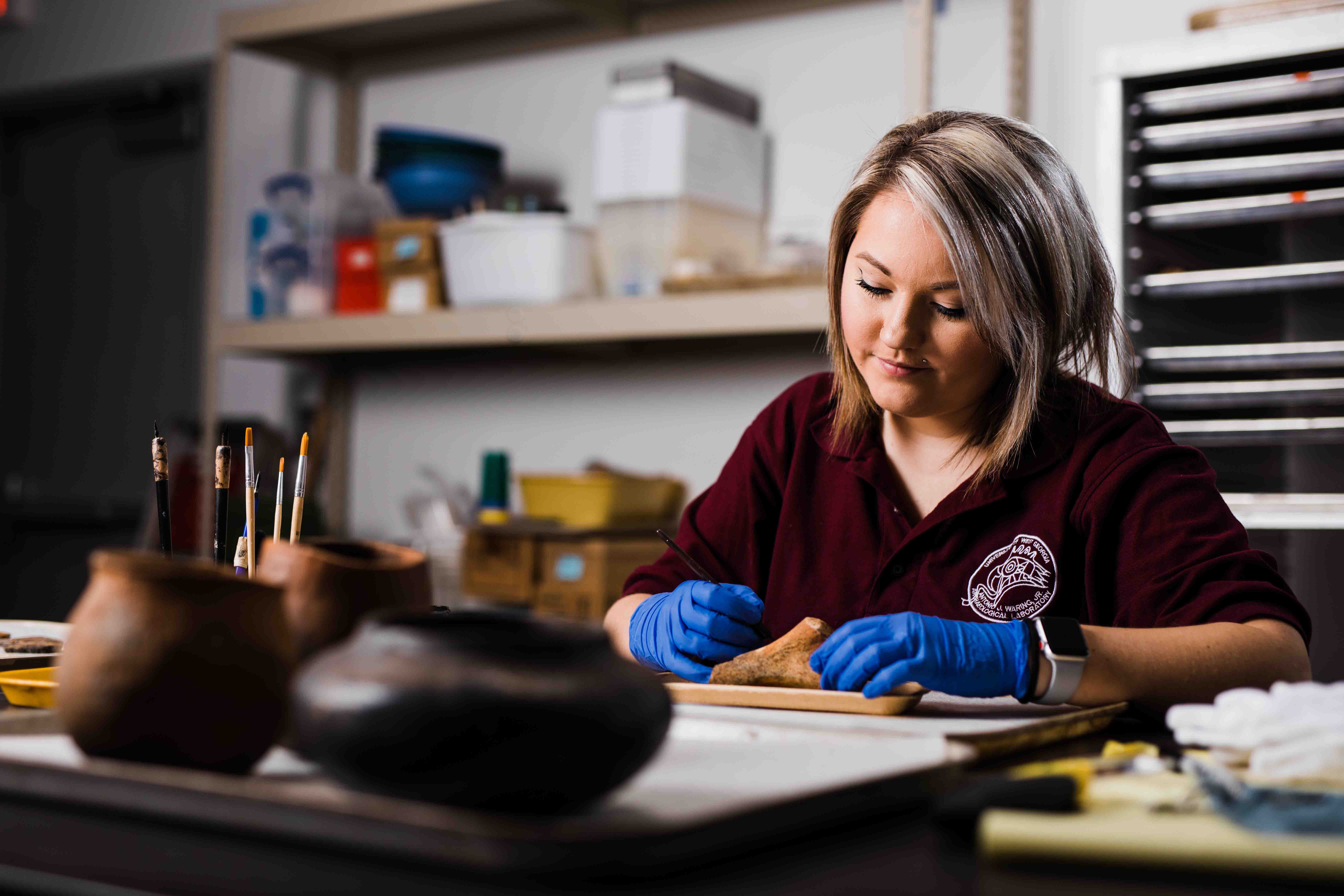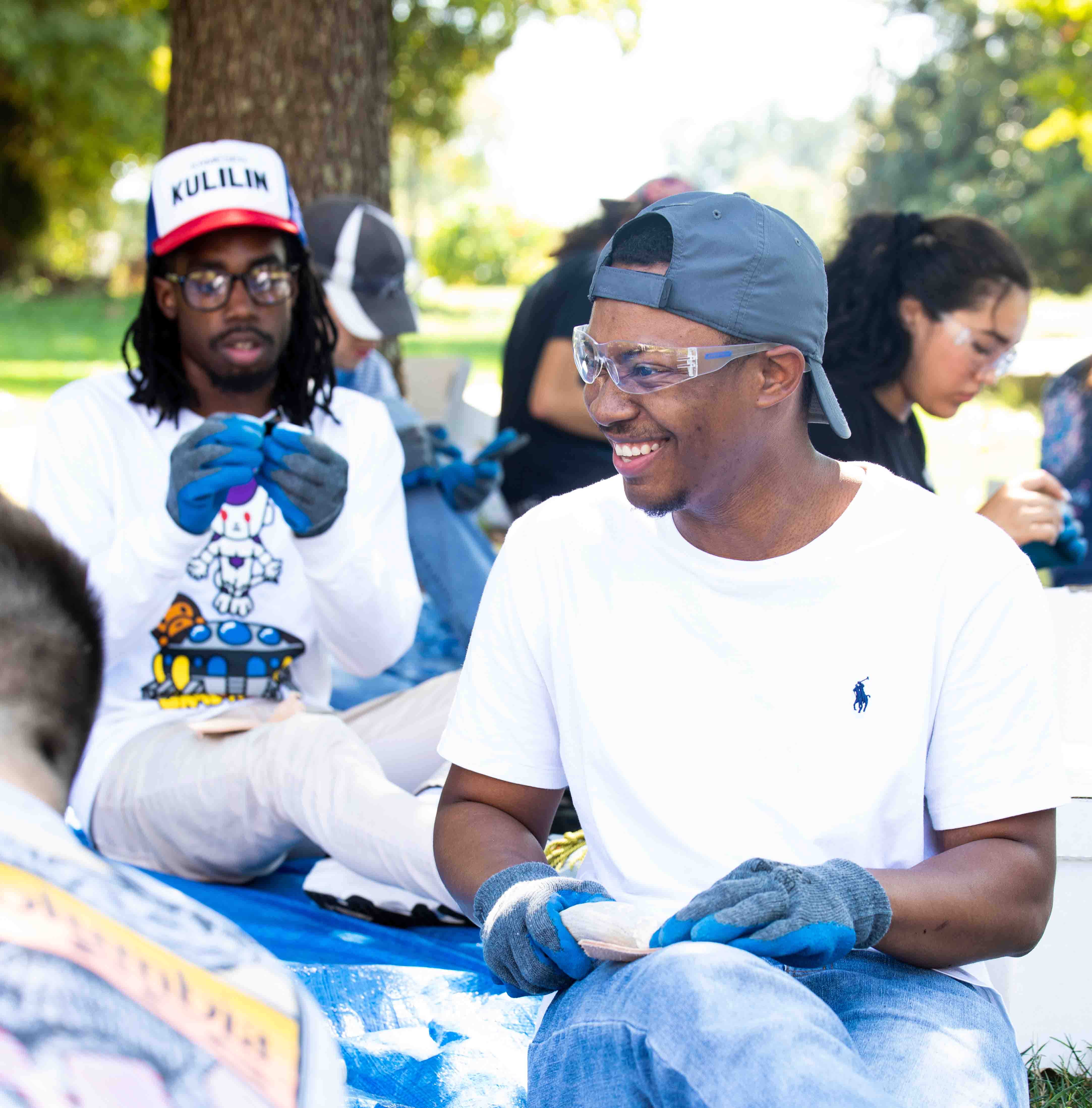B.S. Anthropology Program Map

General Concentration
Anthropology aims to provide its undergraduate anthropology majors with a comprehensive introduction to anthropological knowledge through classroom instruction, experiential learning, and directed research opportunities.
Anthropology
60
Core Credit Hours
34
Major Credit Hours
26
Elective Credit Hours
- Plan Your Degree
- Crush Your Course
- Find Your Place
- Broaden Your Perspectives
- Connect Off-Campus
- Take Care of Yourself
- Pave Your Path
Plan Your Degree
Disclaimer: This program map is intended ONLY as a guide for students to plan their course of study. It does NOT replace any information in the Undergraduate Catalog, which is the official guide for completing degree requirements.
| Course Name | Credit Hours |
|---|---|
| C1: ENGL 1101
English Composition I |
3 |
| M: MATH 1001 OR 1111
Quantitative Skills and Reasoning or College Algebra |
3 |
| I2: XIDS 2002
First Year Seminar |
2 |
| F: ANTH 1102
Introduction to Anthropology |
3 |
| T1: Science + Lab | 4 |
Milestones:
- Complete ENGL 1101 with C or better.
- Complete Core IMPACTS Math.
- Complete Lab Science.
| Course Name | Credit Hours |
|---|---|
| C2: ENGL 1102
English Composition II |
3 |
| F: ANTH 1004, 1100, 1105, OR 2002
Introduction to Archeology, Faces of Culture, Introduction to Physical Anthropology, or Introduction to Cultural Anthropology |
3 |
| S: Social Science | 3 |
| T2: Non-lab Science | 3 |
| I1: Oral Communication | 3 |
Milestones:
- Complete ENGL 1102 with C or better.
- Complete Non-lab science.
- Begin ANTH sub-discipline courses.
15 Fall Credit Hours + 15 Spring Credit Hours = 30 Credit Hours
| Course Name | Credit Hours |
|---|---|
| P: Citizenship | 3 |
|
F: ANTH 1004, 1100, 1105, OR 2002
Introduction to Archeology, Faces of Culture, Introduction to Physical Anthropology, or Introduction to Cultural Anthropology |
3 |
|
ANTH Elective
Upper Division Elective course |
3/4 |
| F: Major Elective | 3 |
| A: Humanities | 3 |
Milestone:
- Start Upper Division electives.
| Course Name | Credit Hours |
|---|---|
| E: Social Science | 3 |
|
F: ANTH 1004, 1100, 1105, OR 2002
Introduction to Archeology, Faces of Culture, Introduction to Physical Anthropology, or Introduction to Cultural Anthropology |
3 |
|
ANTH Elective
Upper Division Elective course |
3/4 |
| T3: STEM Course | 3 |
| A: Humanities | 3 |
Milestone:
- Complete ANTH sub-discipline courses.
15/16 Fall Credit Hours + 15/16 Spring Credit Hours = 30/32 Credit Hours
Additional Information:
- At least one ANTH Upper Division course is required in Linguistic Anthropology, Physical Anthropology, Cultural Anthropology, and Archaeology. All options should be taken from an approved list available on WolfWatch.
| Course Name | Credit Hours |
|---|---|
|
P: Citizenship
|
3 |
|
ANTH Elective
Upper Division Elective course |
3 |
| ANTH Methods | 4 |
| Elective/Minor | 3 |
| Elective/Minor | 3 |
Milestones:
- Continue ANTH Upper Division Elective courses.
- Begin Minor/Electives.
- Complete ANTH Methods before Fall of Year 4.
| Course Name | Credit Hours |
|---|---|
|
ANTH Elective
Upper Division Elective course |
3/4 |
|
ANTH Elective
Upper Division Elective course |
3/4 |
|
ANTH Elective
Upper Division Elective course |
3/4 |
| Elective/Minor | 3 |
| F: Major Elective | 3 |
Milestones:
- Continue ANTH Upper Division Elective courses.
- Begin Minor/Electives.
- Complete all Core IMPACTS course.
| Course Name | Credit Hours |
|---|---|
| ANTH Methods | 4 |
Milestone:
- Complete ANTH Methods before Fall of Year 4.
16 Fall Credit Hours + 15/16 Spring Credit Hours + 4 Summer Credit Hours = 35/36 Credit Hours
Additional Information:
- At least one ANTH Upper Division course is required in Linguistic Anthropology, Physical Anthropology, Cultural Anthropology, and Archaeology. All options should be taken from an approved list available on WolfWatch.
- One Methods course is required for the major. Discuss which option is best with your advisor. The methods course may be taken any summer or during the year. Currently offered methods courses are: ANTH 3188 Ethnographic Field Methods (Summer), ANTH 3250 Field Methods in Physical Anthropology (Summer), ANTH 4102 Archaeological Field Methods (Summer), ANTH 4103 Field Methods in Cultural Resource Management (Summer), and ANTH 4176 Narratives and Storytelling (in-year option). All options should be taken from an approved list available on WolfWatch.
| Course Name | Credit Hours |
|---|---|
| ANTH 4184
Anthropology Capstone |
3 |
| ANTH 4100
History of Anthropological Thought |
3 |
| ANTH Elective Upper Division Elective course |
3/4 |
|
ANTH Elective OR Elective/Minor
Upper Division Elective course or Minor/Elective course |
3/4 |
| Elective/Minor | 3 |
Milestones:
- Complete ANTH 4184 Capstone.
- Complete ANTH 4100 Anth Thought.
| Course Name | Credit Hours |
|---|---|
| ANTH Elective Upper Division Elective course |
3/4 |
| Elective/Minor | 3 |
| Elective/Minor | 3 |
| Elective/Minor | 3 |
| Elective/Minor | 3 |
15/16 Fall Credit Hours + 15/16 Spring Credit Hours = 30/33 Credit Hours
Additional Information:
- ANTH 4100 and ANTH 4184 are offered every Fall. They may be taken in Year 3 or 4.
- At least one ANTH Upper Division course is required in Linguistic Anthropology, Physical Anthropology, Cultural Anthropology, and Archaeology. All options should be taken from an approved list available on WolfWatch.
Crush Your Course
First Year:
- Take ANTH 1102 Intro to Anthropology & ANTH 1105 Intro to Physical Anthropology.
- Take ANTH 1101 Voices of Culture.
Middle Years:
- Complete Area F Anthropology courses.
- Go ahead and take a Methods class in Anthropology and apply what you are learning!
- Take upper-level courses in each Anthropology subfield.
Last Year:
- Take ANTH 4184 and prepare your professional portfolio in Anthropology.
- Finish your required courses and electives in Anthropology.
Find Your Place
First Year:
- Consider joining the Anthropology Club!
- Come in and meet your Anthropology mentors.
- Apply for a Waring Anthropology Scholarship!
Middle Years:
- Get involved in one of the Anthropology labs (Waring Archaeological Lab or BAFAL Biological and Forensic Lab)!
- Talk to your mentors about research topics that interest you and consider doing undergraduate research in Anthropology!
- Apply for various Waring scholarships and awards!
Last Year:
- Consider a leadership position in the Anthropology Club.
- Work with your mentor to present your Anthropology research at a professional conference.
- Apply for Waring scholarships and awards in Anthropology!
Broaden Your Perspectives
First Year:
- Check out the education abroad office.
Middle Years:
- Consider a study abroad program. Check out students’ stories of their experiences.
Last Year:
- Assess your cultural competency.
- Consider working abroad and research visa regulations.
- Explore practices of creating more inclusive careers.
Connect Off-Campus
First Year:
- Visit Wolves Vote to learn about the voting process and registration.
- Consider volunteering for a campaign or organization in your community.
Middle Years:
- Complete an internship in your field.
- Consider a summer or part-time job.
- Ask your department about networking opportunities with alumni.
Last Year:
- Ask for advice from professionals in your field of interest and explore career shadowing opportunities.
- Ask your professors about attending a professional or academic conference and funding opportunities.
- Apply to share your research at a conference presentation or poster session.
Take Care of Yourself
First Year:
- Visit Health Services.
- Get fit! Visit URec to see all your options.
- Visit the Center for Economic Education and Financial Literacy.
Middle Years:
- Take a fitness class, climb the rock wall, or join an intramural team.
- Consider whether counseling is right for you: take a mental health screening.
Last Year:
- Explore a farmer’s market for fresh produce.
- Develop a post-graduation exercise plan.
- Explore your loan repayment options and complete your exit counseling.
Pave Your Path
First Year:
- Complete a self-assessment to see what careers and majors are right for you.
- Visit Career Services.
- Create your profile on Handshake.
- Consider applying for an on-campus job.
Middle Year:
- Draft your resume and attend a resume blitz.
- Learn about how to network on social media and update your Handshake profile.
- Draft your personal statement.
- Visit the graduate school to find out about graduate programs and admission requirements.
Last Year:
- Request references from professors and supervisors.
- Draft your resume cover letter and personal statement and revise it with career services.
- Attend business fairs and career fairs at UWG and across the state.
- Attend an interview workshop.
Apply for graduate programs.
Anthropology Careers

Career Opportunities
This degree may help you get work as the following:
- Archeologist
- Crime Scene/Forensic Investigator
- Counselor
- Epidemiologist
- Human Relations/Social Work
- Law
- Lobbying
- Market Researcher
- Marketing
- Medical Anthropologist
- Museum Curation and Docent/Tour Guide
- Political Activism
- Public Relations
- UX/UI Researcher
HeadingSub-Heading
Have any questions about your major?
Don't forget to check out Wolf Watch to explore degree requirements!
